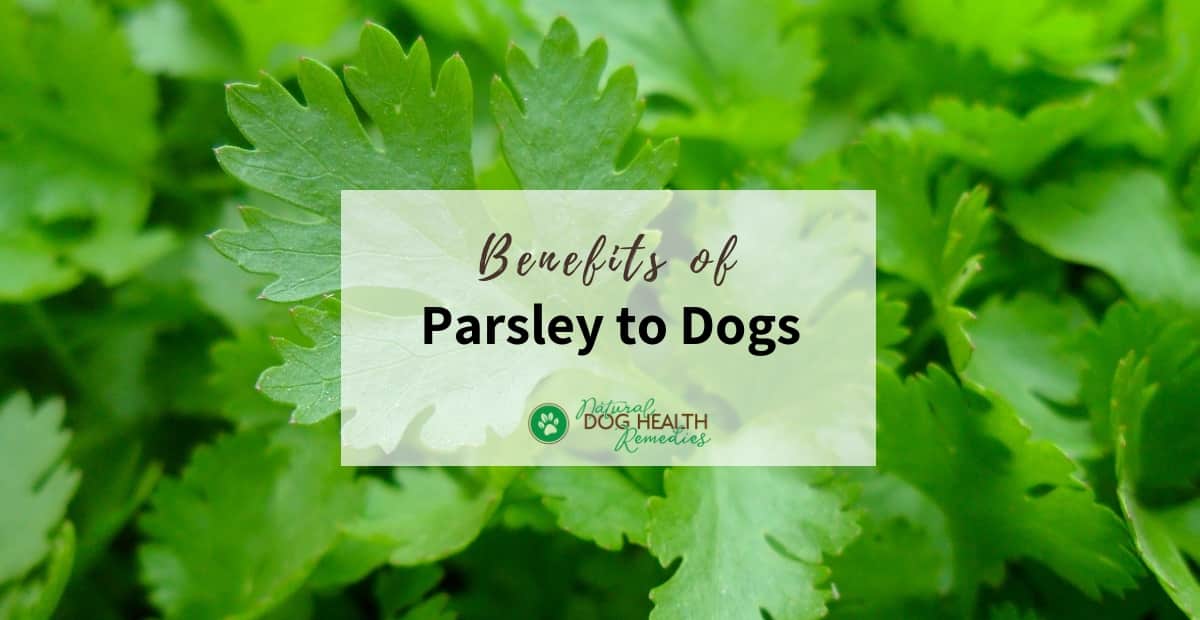Parsley Benefits for Dogs

Overview
Parsley is a common herb, which is nutritive and rich in protein, fiber, and vitamins (A, C, B1, B2, and K). In addition, it also contains trace minerals such as calcium, potassium, iron, magnesium, and phosphorus.
But is parsley safe and good for dogs to eat?
Yes - parsley is extremely safe for dogs. (The one exception is to avoid using this herb during a dog's pregnancy, as parsley stimulates the uterus.)
I think most people actually know that parsley can freshen a dog's breath. But did you know that parsley has more benefits to dogs?
Parsley is antimicrobial and carminative. It is also anti-inflammatory and can help dogs with inflammatory issues such as arthritis and cancer. It is also a diuretic (promotes the flow of urine) and can lower blood pressure.
No small feat for a small herbal plant!
Below are some parsley health benefits to dogs.
Parsley for Dogs' Health
- Dogs with Bad Breath: If your dog's breath is not so fresh and sweet, try sprinkling chopped fresh parsley on his food. Since the herb is antimicrobial, it is effective in preventing bacteria and other germs to multiply in the dog's mouth.
- Dogs with Arthritis: Parsley root is excellent in treating dogs with arthritis. For this purpose, a tincture (1-2 ml/30 lbs of body weight) or a strong tea of the herb (see below) can be used.
- Dogs with Anemia: Since parsley leaves and stems are very nutritive, they can be used to help treat dogs with anemia.
- Dogs with Urinary Issues: The leaves also have antiseptic properties and are helpful in treating urinary tract infections. Since parsley is a diuretic, it is useful in boosting kidney function.
In addition, parsley benefits dogs with heart problems because it helps stimulate the kidneys to eliminate the excess fluids in the lungs and/or other organs.
- Dogs with GI Issues: Since parsley is a carminative herb, it strengthens intestinal muscles. It is therefore effective in treating colic, gas and indigestion.
- Older Dogs: A tea of parsley leaf can be added to our aging dogs' water to help strengthen the mucous membranes in the urinary tract.
- Dogs with Cancer: Parsley adds nutrients to a dog's diet, and it also has anti-cancerous properties as it has been found to inhibit cancer growth!
Makes sense to add this herb to a canine cancer diet, doesn't it? It's also a good idea to add this herb to a dog's food regularly even if he doesn't have cancer as a preventive measure.
- Dogs Stung by Bees: If your dog has been stung by a bee, you can mash a handful of fresh parsley with a little bit of water and rub it on the bee sting. This remedy not only eliminates some of the pain, but also neutralizes the poison.


Making Parsley Tea
To feed parsley to your dog as a nutritive tonic, try to make juice out of fresh leaves by adding water to some fresh leaves and blend them in a blender or juicer. Feed the juice directly to your dog with an empty stomach or add to his drinking water. (1 teaspoon/20 lbs of the dog's body weight).
To use parsley as a medicinal tea for arthritis, urinary tract or gastric issues, you can make an "attenuated infusion". Here is how (as described in Natural Remedies for Dogs and Cats by C.J. Puotinen):
- Add 1 large bunch of fresh parsley to a pan with 1 quart of boiling water.
- Cover and let stand for 3-4 hours.
- Then return the covered pan to the stove and simmer over the lowest heat setting for 1 hour.
- Remove from heat, let cool, and strain.
- You can freeze the tea in ice cube trays for long-term storage.
Add 1 teaspoon/10 pounds body weight to your dog's dinner every day.
Safety Precautions
As mentioned above, while parsley is a safe herb for most dogs, it should not be given to pregnant dogs because it has uterine stimulation action.
Also, do not use the essential oils of either parsley seed or parsley leaf topically on all dogs, especially pregnant dogs. More importantly, do not allow dogs to ingest either of these oils as oral dose is poisonous (to both dogs and people) - toxic to the liver, kidneys, heart and digestive system.
ReferencesJ.A. Duke, The Green Pharmacy Herbal Handbook: Your Comprehensive Reference to the Best Herbs for Healing (Rodale Books, 2000).
C.J. Puotinen, Natural Remedies for Dogs and Cats (Keats Publishing, 1999).
R. Kidd, Dr. Kidd's Guide to Herbal Dog Care (Storey Publishing, 2000).
M.L. Wulff-Tilford and G.L. Tilford, Herbs for Pets (Bowtie Press, 1999).





